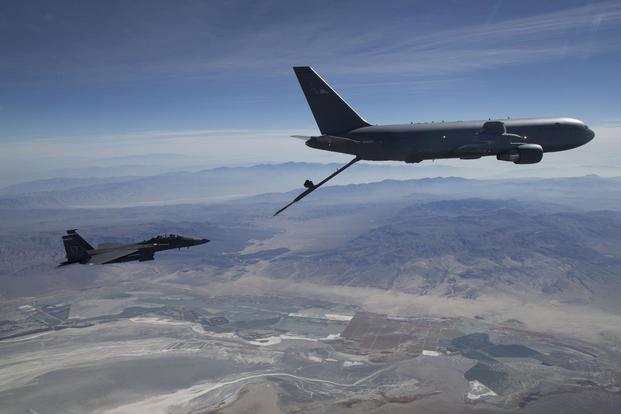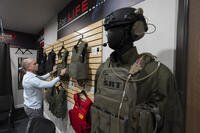The U.S. Air Force will begin accepting its newest refueling tankers from Boeing Co. this month despite continuing problems.
The KC-46 Pegasus will hit flight lines at McConnell Air Force Base, Kansas, by the end of January and at Oklahoma's Altus Air Force Base in February, Boeing and service officials said Thursday.
But the aircraft will arrive with deficiencies that the company has agreed to fix after delivery, said Air Force spokeswoman Capt. Hope Cronin.
"We have identified, and Boeing has agreed to fix at its expense, deficiencies discovered in developmental testing of the remote vision system," Cronin said in a statement. "The Air Force has mechanisms in place to ensure Boeing meets its contractual obligations while we continue with initial operational testing and evaluation."
Related content:
- KC-46 Tanker Delivery Will Be Delayed, Air Force Confirms
- Will Ongoing KC-46 Tanker Problems Affect KC_10 Retirement?
- Air Force's Future Tanker Sees Rising Cost Overruns
Four aircraft will go to McConnell and another four to Altus. Another nine aircraft are "undergoing customer acceptance testing, with the remaining aircraft of the contracted amount in production," Boeing said in a statement.
The company has contracted for 52 of the 179 tankers the Air Force intends to buy.
Boeing is responsible for any cost overruns, which had climbed to $3.5 billion as of October, the company said.
The service awarded Boeing a fixed-price, $4.9 billion contract in 2011. The company was supposed to deliver the initial 18 aerial refueling planes by August 2017.
With ongoing issues throughout the program since its start in 2013, such as design problems in the refueling boom, Boeing and Air Force officials then said the first delivery would be pushed to February 2018.
"Boeing is saying that they are going to deliver in the second quarter of 2018," Air Force Secretary Heather Wilson said during a House Armed Services Committee hearing last year.
"The Air Force thinks it is more likely to be late 2018. And Boeing has been overly optimistic in all of their schedule reports."
But the tanker experienced even more setbacks. The drogue hose, used during refueling, kept unexpectedly and prematurely disconnecting from receiving aircraft during testing. And the remote vision system (RVS), which allows aircrew to accurately view the fuel boom for better control, experienced issues in different lighting conditions, throwing refuelers off with an unclear display, Defense News reported.
The RVS, which is made by Rockwell Collins and permits the in-flight refueling operator to view the refueling system below the tanker, has been subject to frequent software glitches. The first tankers will be delivered despite that problem. The systemic issue, which will require a software and hardware update, may take three to four years to fix, Cronin told Defense News on Thursday.
Boeing said the Pegasus completed "more than 3,800 flight hours and offloaded more than four million pounds of fuel to A-10, B-52, C-17, KC-10, KC-135, KC-46, F-15E, F-16 and F/A-18 aircraft" during months of testing.
"We look forward to working with the Air Force, and the Navy, during their initial operational test and evaluation of the KC-46, as we further demonstrate the operational capabilities of this next-generation aircraft across refueling, mobility and combat weapons systems missions," Leanne Caret, president and CEO of Boeing Defense, Space & Security, said Thursday.
The KC-46 is meant to replace older tanker fleets, such as the KC-135 Stratotanker and KC-10 Extender. It is expected to replace some of those fleets at bases such as Travis Air Force Base, California, and Joint Base McGuire-Dix-Lakehurst, New Jersey.
The total current inventory of KC-10s and KC-135s sits at 455 aircraft.
The Air Force plans to retire part of its legacy aerial refueling fleet and meet its 479-tanker total force requirement with a mix of KC-46s and KC-135s in the future.
All three tankers are manufactured or have been upgraded by Boeing.
-- Oriana Pawlyk can be reached at oriana.pawlyk@military.com. Follow her on Twitter at @Oriana0214.










